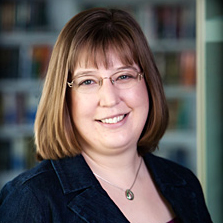News & Events
Susanna Widicus, Ph.D.
Posted on September 15, 2017

When
Date - September 15, 2017
1:00 pm - 2:00 pm
What
Associate Professor and Director of Graduate Studies
Department of Chemistry
Emory College
Talk Title: “Prebiotic Astrochemistry in the ‘THz-Gap’”
Abstract:
Small reactive organic molecules are key intermediates in interstellar chemistry, leading to the formation of biologically-relevant species as stars and planets form. These molecules are identified in space via their pure rotational spectral fingerprints in the far-IR or terahertz (THz) regime. Despite their fundamental roles in the formation of life, many of these molecules have not been spectroscopically characterized in the laboratory, and therefore cannot be studied via observational astronomy. The reason for this lack of fundamental laboratory information is the challenge of spectroscopy in the THz regime combined with the challenge of studying unstable molecules. Ions, radicals, and small reactive organics tend to be produced in trace quantities, often at high energies, and therefore have weak laboratory spectra. In addition, THz spectrometers have historically lagged behind those in other wavelength regimes because of a lack of sources and detectors that provide the power and sensitivity needed for such studies. The laboratory astrochemistry portion of my research program combines innovative spectroscopic approaches that seek to increase spectral sensitivity in the THz regime with novel chemical production mechanisms for species of astrochemical interest. Our laboratory work involves characterization of astrophysically-relevant unstable species, including small radicals that are the products of photolysis reactions, organic ions formed via plasma discharges, and small reactive organics that form via O(1D) insertion reactions. In this seminar, I will present recent results from our laboratory studies, and discuss these results in the broader context of my integrative research program that encompasses laboratory spectroscopy, observational astronomy, and astrochemical modeling.





